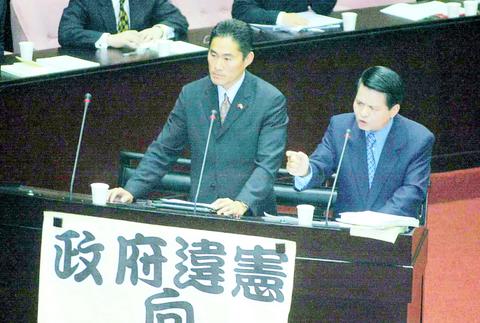Premier Yu Shyi-kun's English skills were tested to the limit yesterday at the legislature when TSU lawmaker John Wang (王政中) quizzed him in English during an interpellation session.
"I heard from abroad that MOFA [Ministry of Foreign Affairs] is arranging a meeting between the first lady and the first lady of the US, Laura Bush. Is this a correct assumption?" Wang asked in fluent English.
The legislator, representing overseas Chinese communities, was referring to the recent itinerary of first lady Wu Shu-chen (吳淑珍), who is visiting Washington.

PHOTO: CHIANG YING-YING, TAIPEI TIMES
Failing to understand the question, the premier looked perplexed.
Minister of Foreign Affairs Eugene Chien (簡又新), who stood next to Yu, came to his rescue and gave Yu a translation.
Yu then replied in Mandarin that he had had a bumpy educational process and that his skill in languages was not as good as most people's. "[Therefore] my English is very bad, I only speak a little English," Yu added, in English.
"This is quite OK because I think it is important that you try as a leader of the nation. I think it is a good start," Wang said.
Wang, who grew up in the US and has a very limited Mandarin ability, said the reason he questioned the premier in English was to remind people to improve their command of English as part of Taiwan's globalization drive.
"Leaders such as Yu or President Chen Shui-bian (陳水扁) should take the lead," he said.
The lawmaker is the son of Kenjohn Wang (王桂榮), chairman of the Taiwanese-American Foundation, a pro-independence group in the US.

Nipah virus infection is to be officially listed as a category 5 notifiable infectious disease in Taiwan in March, while clinical treatment guidelines are being formulated, the Centers for Disease Control (CDC) said yesterday. With Nipah infections being reported in other countries and considering its relatively high fatality rate, the centers on Jan. 16 announced that it would be listed as a notifiable infectious disease to bolster the nation’s systematic early warning system and increase public awareness, the CDC said. Bangladesh reported four fatal cases last year in separate districts, with three linked to raw date palm sap consumption, CDC Epidemic Intelligence

The manufacture of the remaining 28 M1A2T Abrams tanks Taiwan purchased from the US has recently been completed, and they are expected to be delivered within the next one to two months, a source said yesterday. The Ministry of National Defense is arranging cargo ships to transport the tanks to Taiwan as soon as possible, said the source, who is familiar with the matter. The estimated arrival time ranges from late this month to early next month, the source said. The 28 Abrams tanks make up the third and final batch of a total of 108 tanks, valued at about NT$40.5 billion

Two Taiwanese prosecutors were questioned by Chinese security personnel at their hotel during a trip to China’s Henan Province this month, the Mainland Affairs Council (MAC) said yesterday. The officers had personal information on the prosecutors, including “when they were assigned to their posts, their work locations and job titles,” MAC Deputy Minister and spokesman Liang Wen-chieh (梁文傑) said. On top of asking about their agencies and positions, the officers also questioned the prosecutors about the Cross-Strait Joint Crime-Fighting and Judicial Mutual Assistance Agreement, a pact that serves as the framework for Taiwan-China cooperation on combating crime and providing judicial assistance, Liang

Reports of Taiwanese going missing, being detained or interrogated, or having their personal liberties restricted in China increased about fourfold annually last year, the Mainland Affairs Council (MAC) said yesterday. Last year, 221 Taiwanese who traveled to China were reported missing, were detained and interrogated, or otherwise had their personal freedom restricted, up from 55 the previous year, the council said. Reopening group tours to China would be risky, as it would leave travelers with no way to seek help through official channels after Beijing shut down dialogue between the associations tasked with handling cross-strait tourism, the MAC said. Taipei’s Taiwan Strait Tourism